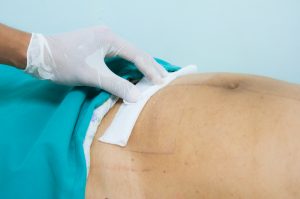 If you have suffered a hernia, you know this painful medical condition can be quite debilitating. Some people ignore a small hernia for weeks, months or even years, while others must have surgery right away to correct their hernia.
If you have suffered a hernia, you know this painful medical condition can be quite debilitating. Some people ignore a small hernia for weeks, months or even years, while others must have surgery right away to correct their hernia.
According to WebMD, a hernia “occurs when an organ or fatty tissue squeezes through a weak spot in a surrounding muscle or connective tissue called fascia.” These are the most common types of hernia and their location:
- Inguinal hernia (inner groin)
- Incisional (results from an incision)
- Femoral (outer groin)
- Umbilical (belly button)
- Hiatal (upper stomach)
Mesh Migration: Causes and Results
Because a hernia usually involves a bulge of organ or tissue that breaks through muscle or tissue, a painful tear occurs at the point of organ or tissue protrusion. The causes of hernia vary, but most are caused by muscle weakness and strain caused by age, chronic coughing, chronic constipation, heavy lifting or damage that occurred during surgery.
When you have surgery for a hernia, the surgeon often places mesh over the hernia site to keep the intestine or organ from protruding through the hole caused by the tear. The mesh is supposed to stay in place for the rest of your life, prevent future hernias. However, if the mesh becomes dislodged and travels to another place in your body, known as mesh migration, you may suffer serious health complications, some of those being life threatening.
Medical Malpractice or Product Liability?
If the surgeon failed to secure the mesh in its proper place, you may have a medical malpractice claim. Mesh migration may also occur if the mesh shrinks and becomes dislodged over time. Hernia mesh was initially made with materials thought to be safe, but some of these materials have been recalled over the years because of their tendencies to move out of place and cause serious problems. Faulty medical products and devices often lead to serious complications and even death. Mesh migration may take place rather quickly following hernia surgery, or it may happen years after your surgery.
Mesh that has been dislodged can cause a lot of problems and interfere with body process and damage internal organs; dislodged mesh has punctured organs and tangled nerves, both of which result in terrible pain requiring urgent medical care. When mesh becomes dislodged, the chance of suffering another hernia greatly increases. The clearest signs that mesh migration has occurred are pain and the re-occurrence of a hernia. If blood is present in your urine, the mesh may have traveled as far as the bladder.
Recalled Mesh Products
You will often see commercials for recalled medical products that are defective or faulty in some way, and mesh patches are frequently recalled due to dangerous defects like migration and being made from dangerous materials. If you have suffered health complications due to a defective mesh patch, you will need a defective product attorney, and if your health problems were caused by medical error, you will need a medical malpractice attorney.
Attorney Eric R. Bernstein handles both medical malpractice and defective medical device lawsuits. Please call now to schedule a free consultation to ensure you’re your claim is not barred by the statute of limitations.
